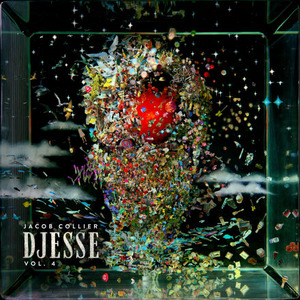Jacob Collier is a musical prodigy. A virtuoso. Some have even called him a “genius”. Arranger Quincy Jones made him his protégé; pianist Herbie Hancock compared him to Igor Stravinsky.
He can harmonize voices ad infinitum, plays numerous instruments, and has made a name for himself with rereadings of great pop songs, including Stevie Wonder’s “Don’t Worry About a Thing” in 2013. You’ve got to see the video – it’s mind-blowing!
But does this incredible talent necessarily lead to great songs? That’s the question that arises with the release of Djesse Vol 4, the latest opus in this musical tetralogy begun in 2018 with a jazz-symphonic album featuring Vienna’s Métropole Orchestra.
After this musically rich Vol 1, there was a folk-oriented Vol 2 and a more R&B-oriented Vol 3. Vol 4 attempts to synthesize the whole work. At the age of 29, Jacob Collier declared that he wants to make less complicated music. By the way, he still looks like a teenager in pyjamas.
Djessie Vol 4 offers us sixteen songs and almost seventy minutes of music. In my humble opinion, the result is a mixed bag, but there are still plenty of nuggets. With his immense talent, Jacob Collier can’t make a bad album. But, as the saying goes, he who embraces too much, embraces poorly.
“100,000 Voices” gets the album off to a bad start. This collage, designed to appeal to Collier’s large audience, leads to some rather indigestible pseudo-prog rock. It gets a little better with “She Put Sunshine”, but, once again, we lose ourselves in all kinds of effects. “WELLLL”, the fourth track, plunges us into pseudo-metal that turns into harmonic vocal jazz. Not convinced.
On the other hand, the numerous ballads featuring countless collaborators are far more interesting. Starting with the deeply moving reworking of Simon & Garfunkel’s “Bridge Over Troubled Water”, featuring Tori Kelly and John Legend. Also, “Summer Rain”, with Madison Cunnigham and Chris Thile, “Little Blue”, with Brandi Carlile, and “Cinnamon Crush”, with Lindsey Lomis. The final piece, “World O World”, takes us back to the church choir atmosphere visited in Vol. 1.
Jacob Collier also ventures into Indian introspection with Anoushka Shankar. It’s rather successful. Conversely, his immersion in Spanish-language pop music would have benefited from a more interesting collaboration than that of Colombian Camilo. Natalia Lafourcade, Rosalia, Jorge Drexler, Kevin Johansen… for next time.
Let’s agree: Djesse Vol 4 remains an interesting pop album. But more predictable. If you’re not familiar with Jacob Collier, it’s best to start with the first two Djesse volumes, which are much more tinged with jazz, vocal harmonies and improvisation.
Now that the Djesse cycle is over, we’ll see where the young prodigy decides to go next. In the meantime, he’ll be at Place Bell in Laval on April 23. Hopefully, he’ll be performing the entire tetralogy.
























